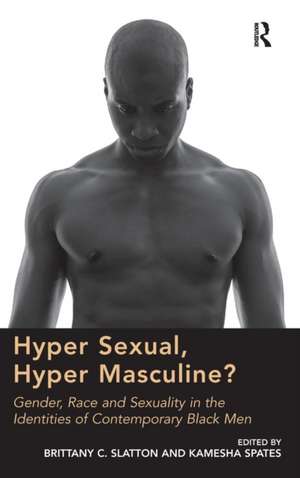Hyper Sexual, Hyper Masculine?: Gender, Race and Sexuality in the Identities of Contemporary Black Men
Editat de Brittany C. Slatton, Kamesha Spatesen Limba Engleză Hardback – 28 iun 2014
| Toate formatele și edițiile | Preț | Express |
|---|---|---|
| Paperback (1) | 256.76 lei 6-8 săpt. | |
| Taylor & Francis – 30 iun 2020 | 256.76 lei 6-8 săpt. | |
| Hardback (1) | 1109.51 lei 6-8 săpt. | |
| Taylor & Francis – 28 iun 2014 | 1109.51 lei 6-8 săpt. |
Preț: 1109.51 lei
Preț vechi: 1353.07 lei
-18% Nou
Puncte Express: 1664
Preț estimativ în valută:
212.29€ • 221.68$ • 175.31£
212.29€ • 221.68$ • 175.31£
Carte tipărită la comandă
Livrare economică 15-29 aprilie
Preluare comenzi: 021 569.72.76
Specificații
ISBN-13: 9781472425126
ISBN-10: 147242512X
Pagini: 200
Ilustrații: Includes 3 b&w illustrations
Dimensiuni: 156 x 234 x 13 mm
Greutate: 0.46 kg
Ediția:New ed
Editura: Taylor & Francis
Colecția Routledge
Locul publicării:Oxford, United Kingdom
ISBN-10: 147242512X
Pagini: 200
Ilustrații: Includes 3 b&w illustrations
Dimensiuni: 156 x 234 x 13 mm
Greutate: 0.46 kg
Ediția:New ed
Editura: Taylor & Francis
Colecția Routledge
Locul publicării:Oxford, United Kingdom
Cuprins
Hyper Sexual, Hyper Masculine?
Recenzii
’The editors of this collection have impressively gathered a variety of voices - men, women, gay, straight, from graduate students to full professors, as well as those from outside of the academy - to investigate the variety of intersections of race, gender, and sexuality through the experiences of black men. Potent in its breadth and impactful in its import, this collection brilliantly empowers and does not pathologize understandings of black male identity.’ Juan Battle, Graduate Center, CUNY, USA ... this book is an important intervention into race and gender studies literature, and in particular its emphasis on intersectional identities is a refreshing and interesting contribution. It would serve well as an introduction to those interested in the problem of intersectionality, specifically with respect to race and masculinity. ... Hyper Sexual, Hyper Masculine? does the important work of addressing some of the myths and stereotypes that plague black men, and recognises the danger inherent in black men’s alterity... LSE Review of Books
Notă biografică
Brittany C. Slatton is Assistant Professor of Sociology at Texas Southern University, USA and author of Mythologizing Black Women: Unveiling White Men’s Racist and Sexist Deep Frame. Kamesha Spates is Assistant Professor of Sociology at Kent State University, USA and author of What Don't Kill Us Makes Us Stronger: African American Women and Suicide.
Descriere
Presenting new interview and auto-ethnographic data, and drawing on an array of theoretical approaches methodologies, Hyper Sexual, Hyper Masculine? explores the formation of gendered and sexual identity in the lives of black men, shedding light on the manner in which these are affected by class and social structure. It examines the intersecting oppressions of race, gender and class, while acknowledging and discussing the extent to which black men’s social lives differ as a result of their varying degrees of cumulative disadvantage.




